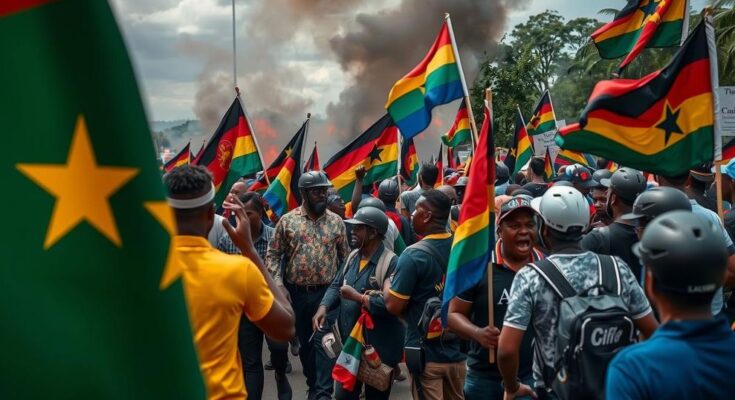Mozambique is experiencing significant protests following a disputed presidential election on October 9, where the ruling Frelimo party extended its power. The election, perceived as fraudulent by opposition parties, has led to violent responses from police and a subsequent rise in casualties. The unrest reflects deep-rooted political dissatisfaction and socioeconomic issues, with calls for reform echoing throughout the country.
Mozambique is currently engulfed in widespread protests following the October 9 presidential elections, which resulted in the ruling Frelimo party extending its dominance for another term. The election outcome, which has been met with allegations of fraud, has incited significant civil unrest, particularly in the capital, Maputo. Security forces have responded to the escalating protests with violent tactics, including tear gas and rubber bullets, resulting in numerous casualties among demonstrators as tensions heighten and calls for justice become more fervent. The protests emerged after Daniel Chapo of Frelimo was declared the winner of the presidential election on October 24, leading to accusations from opposition parties of electoral fraud, including ballot stuffing and voter list manipulation. Civil rights organizations report that at least 20 individuals have been killed in clashes, while local estimates suggest the numbers could exceed 50. A climate of fear persists, exacerbated by government efforts to restrict internet access and block social media, further limiting communication about the violence. Neighboring South Africa has reacted by closing its border with Mozambique amidst increasing instability. Independent candidate Venancio Mondlane has vocally denounced the election’s legitimacy, urging a national strike and encouraging citizens to remain at home in protest. Following the assassination of prominent opposition figures, Mondlane feared for his safety and reportedly sought asylum. The protests have gained momentum as citizens express their discontent against a government accused of suppressing dissent while failing to improve living conditions. The international community takes a keen interest in the ongoing situation, with local leaders facing pressure to address the unrest and the grievances of the populace. In a nation still recovering from a devastating civil war, longstanding tensions rooted in economic disparity and political exclusion remain unaddressed, which has allowed a disillusioned youth to rally against the government’s ineffective policies. The situation in Mozambique highlights the need for reform and accountability as citizens seek to resolve the issues stemming from decades of political strife, economic inequality, and societal division.
The unrest in Mozambique follows a series of contentious elections that have historically been marred by allegations of fraud and government repression. The ruling Frelimo party has been in power since the country gained independence from Portugal in 1975. Elections conducted under their stewardship have consistently raised concerns among international observers and local opposition groups regarding electoral integrity. With Mozambique possessing significant natural resources, including gas fields, political stability is crucial for economic development; however, widespread dissatisfaction among the population has led to repeated civil disturbances, particularly among the youth disillusioned by the government’s inability to address their concerns effectively. Previous elections have seen opposition parties claiming electoral fraud, with international bodies acknowledging irregularities in the election process. The history of civil conflict continues to cast a shadow over the nation, influencing current socio-political dynamics and fueling opposition movements seeking meaningful change.
The protests in Mozambique serve as a manifestation of long-standing grievances against the ruling party and reflect a broader demand for political accountability and societal reform. With significant bloodshed reported and a history of electoral disputes, the consequences of this unrest remain uncertain. As the government contemplates intensifying its response to quell dissent, the potential for further escalation persists, drawing both national and international scrutiny. The situation underscores a critical moment for Mozambique as it grapples with its political future amidst calls for change and justice.
Original Source: apnews.com




